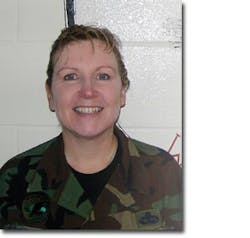Mastering AGE
Q: How did you get into AGE?
A: AGE was my first choice for jobs out of basic training. I was coming in “open mechanics,” and it sounded interesting.
Q: What was your most interesting AGE experience while stationed outside of the country?
A: I had to take a lowpac off base at Dhahran to assist one of the key local liaisons. It seems he parked in a no-parking zone; he was blocking an access and needed to move immediately. Rather than ticket and tow him, the local constable pulled the valve stems out of his tires. If I had known, I would have brought some from benchstock. I pulled up, walked around, looked at the car, then asked him if he knew where the valve stems were. He handed me the valve caps. I guess the cops just chucked them across the lot. So I filled the tires with air, then popped the caps he gave me on. I told him he should just move to a regular parking spot, so I could get the parts to properly fill his tires up. He must have been very embarrassed, because he jumped in the car and drove off. I never saw him again.
Q: How do AGE operations differ around the world?
A: Maintaining AGE is a constant; it doesn’t vary much from place to place. Each base, however, has its own idiosyncrasy and you must adjust yourself for each scenario.
At Kadena we had typhoon evacuations. We usually had an hour to put all our equipment into designated locations. Six hours later, we were pulling it out again.
At McChord on very clear days, you expected things to slow down. The view of Mt. Rainer is so majestic, everyone stops to take a look.
At Keflavic the wind blows all the time. One Saturday on weekend duty, I didn’t take that into consideration and ended up chasing a B-4 stand across the ice-ladened parking ramp.
At Lakenheath you are just going to get wet. If you wait for it to stop raining, you will not get much done.
At Barksdale the lightning storms are spectacular. When they say lightning within five, they mean it. If you are driving — stop! And grab anyone you see standing on the flight line and get them out of the weather.
At Ellsworth we have cattle grates at all ECPs, because there are two herds of wild deer wandering around the base. Every once in a while, some sneak out onto the flight line.
Q: What was the biggest challenge you faced while deployed to Operation DESERT SHIELD/STORM?
A: Acclimating myself to the different beliefs of our host nation. It is hard to get your arms around the fact that other countries do not look at the world the same way as we do in the US.
Q: How have you benefited as a result of on-the-job training?
A: All the reading and perfect scenario technical school training only go so far. You have to get down and dirty and have a couple “wow, it doesn’t normally do that”s to fully appreciate how intricate our equipment can be.
Q: How has the continuous travel affected you professionally? Personally?
A: Moving is one of the most stressful times for a family. There is a seemingly unending list of things to do. Packing and watching your things leave, then unpacking them and checking that everything is there can be difficult, even for young children. And yet, it is exhilarating looking forward to a new assignment; sharing and learning new ideas and ways of doing things with coworkers and neighbors. I believe I have come further having moved around than I would if I had stayed at one or two bases.
Q: What has been your most exhilarating experience while enlisted?
A: Pick one? Making tech sergeant was great! What an awesome feeling standing there with the flight and having my name called. Wheew!
Helping load up a 141 with the last of my AGE at Moses Lake, Wash., and getting on board at the last minute, knowing everything was in place — nothing left undone — was pretty fantastic too.
And there’s the many times I spent hours troubleshooting and working a unit, then finally hit that start switch and all runs smoothly.
